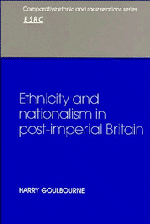Book contents
- Frontmatter
- Contents
- List of figures
- Acknowledgements
- 1 Introduction
- 2 The general problem
- 3 The communal option
- 4 Traditional and ethnic nationalism
- 5 From imperial British to national British
- 6 Diasporic politics: Sikhs and the demand for Khalistan
- 7 Diasporic politics: the demand for democracy in Guyana
- 8 Nationalism and the new pluralism in Britain
- 9 Conclusion: the need for a new national consciousness
- Notes
- Bibliography
- Index
7 - Diasporic politics: the demand for democracy in Guyana
Published online by Cambridge University Press: 05 January 2012
- Frontmatter
- Contents
- List of figures
- Acknowledgements
- 1 Introduction
- 2 The general problem
- 3 The communal option
- 4 Traditional and ethnic nationalism
- 5 From imperial British to national British
- 6 Diasporic politics: Sikhs and the demand for Khalistan
- 7 Diasporic politics: the demand for democracy in Guyana
- 8 Nationalism and the new pluralism in Britain
- 9 Conclusion: the need for a new national consciousness
- Notes
- Bibliography
- Index
Summary
Introduction
This chapter is something of a study in contrasts, because diasporic politics amongst Commonwealth Caribbean people in Britain are relatively inconspicuous. Indeed, the unpronounced nature of these politics appears in sharp relief against the political activities of West Indians regarding political life in Britain itself. The exilic or diasporic politics of people from the Anglophone Caribbean in Britain also contrast sharply with those of minorities from Southern Europe or South East Asia. This is not to say that there is an absence of groups and individuals in Britain who are deeply concerned about political life ‘back home’ in the Caribbean. The nature of the interest in these politics and their relatively low profile in Britain amounts, however, to something of a paradox for the observer.
An explanation of this apparent paradox is offered here. It examines, first, the Caribbean background to the politics of ‘back home’, or homeland politics, amongst West Indians in Britain and, secondly, it examines the kinds of support specific groups of Guyanese living in Britain give to the cause of democracy in the exceptional case of Guyana. Aspects of the kind of colonialism the region experienced as well as the political institutions and practices developed in the post-colonial period are necessarily involved in such an attempt. Attention is drawn, then, to the Guyanese situation because, of all Caribbean groups in this country, it comes closest to the experience of other recently settled communities in Britain which are deeply involved with the politics of their ‘homelands’ outside the United Kingdom.
- Type
- Chapter
- Information
- Ethnicity and Nationalism in Post-Imperial Britain , pp. 170 - 213Publisher: Cambridge University PressPrint publication year: 1991



